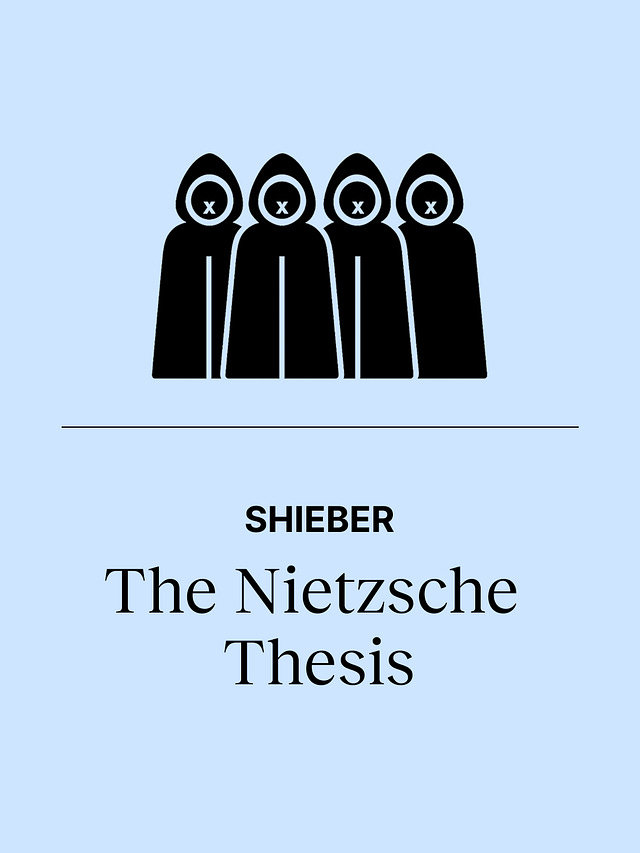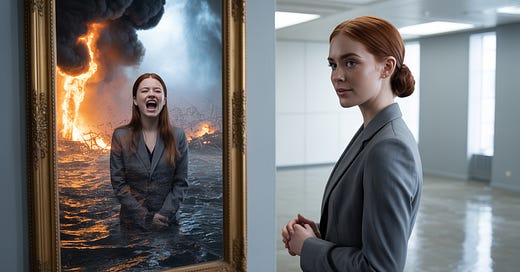We are living through the collapse of the planetary systems that sustain life. You would not know it from watching the news, scrolling through your feed, or listening to a political debate.
Instead, we are bombarded with petty scandals, budget skirmishes, and the strategic theater of electoral performance. The temperature rises, but the discourse remains cool—detached, performative, irrelevant.
This isn’t just denial. It’s ideology.
Because to truly reckon with climate collapse would mean admitting that no one is in control. That the system is failing. That the people and institutions we’ve been taught to trust—governments, experts, markets—do not, in fact, have a plan.
It would mean confronting the terrifying possibility that the Great Other is gone.
In Lacanian psychoanalysis, the grand Autre—the Great Other—is the symbolic order that guarantees meaning. It is the imagined authority that holds everything together: the law, the state, the parent, God, capital-T Truth. We never meet the Great Other directly, but we believe in it. Our identities, desires, and behaviors are organized around the assumption that it exists.
Zizek sharpened this idea: the Great Other does not need to be real to function. We act “as if” it exists, because the illusion is stabilizing. It gives coherence to an otherwise chaotic world.
But when it comes to climate, this illusion is cracking. We know that climate change is real. We know that current policies are wholly inadequate. We know that the timelines are accelerating. And yet—nothing fundamental changes.
Why?
Because the Great Other—the idea that someone, somewhere is in charge—is still doing ideological work. We pretend that governments are managing the crisis. That innovation will save us. That the economy knows what it’s doing.
Zizek called this fetishist disavowal: “I know very well that things are bad, but still…”
Still—we vote. We consume. We plan for the future. We tell ourselves stories that let us carry on.
Political Ritual as Climate Denial
Climate denial is often misunderstood as ignorance or misinformation. But for many political elites, it is something more dangerous: a strategic performance of normalcy.
The rituals of state—press conferences, summits, budgets, policy papers—are enacted not because they solve the crisis, but because they reaffirm the symbolic order. They reassure us that politics is still functional. That the grownups are in the room.
This is not governance. It is theater.
Political institutions are not structured to confront collapse. They are structured to sustain belief in the continuity of order. Admitting that the climate crisis is existential, that it calls for systemic transformation, would break the spell.
So instead, they evade, defer, distract.
They perform.
Gregory Bateson—anthropologist, systems theorist, cybernetician—offered a different way of seeing. He argued that the major crises of our time emerge from a fundamental epistemological error: a way of thinking that separates humans from nature, mind from body, subject from system.
We do not have the tools to think about systems of which we ourselves are a part.
Climate change is not just a physical crisis. It is a crisis of perception, of meaning, of relationship. It reveals the limits of a fragmented worldview that treats the Earth as object, politics as performance, and knowledge as control.
In Bateson’s terms, the climate emergency is not a thing to be solved. It is a feedback loop—an ecological response to human arrogance. Our inability to act is not due to lack of data, but lack of wisdom.
We are trained to see ourselves as masters of nature. But nature sees us differently: as participants in a complex, interconnected web whose logic we barely grasp.
When the Symbolic Order Collapses
When the Great Other fails, the consequences are not simply intellectual—they are political, psychological, existential.
In the absence of trusted authority, people turn to counterfeit substitutes: conspiracy theories, algorithmic certainty, charismatic strongmen. The loss of symbolic coherence makes us vulnerable to authoritarianism, which promises not truth, but stability.
Climate chaos fuels this drift. It generates fear, displacement, uncertainty. It erodes trust in institutions and accelerates the search for scapegoats. It feeds nationalism and nativism, surveillance and control, eco-fascism and digital feudalism.
The longer the symbolic order refuses to confront the crisis, the more radical its collapse will be.
What happens when we give up on the fantasy that someone is in charge?
What if we stopped pretending that the Great Other exists, and began building a symbolic order grounded in ecology, mutuality, and care?
This is where Bateson’s vision becomes political. He called for a new epistemology—an ecology of mind—that values pattern over product, relationship over authority, learning over control.
We must relearn what it means to be alive together. To think in systems. To feel the feedback. To build institutions that are adaptive, humble, and participatory—not heroic.
This is not just climate strategy. It is existential reckoning.
It is learning to live without the Great Other.
And in doing so, becoming something new.

 Tiktok failed to load.
Tiktok failed to load.Enable 3rd party cookies or use another browser






We probably need to be precise here: “We must relearn what it means to be alive together. To think in systems” thinking in systems often seems like circuitry and bureaucracy—but it is ecological systems that probably require the most focus and mimicry. Those systems seem pretty self-sustaining till we came along and created the imbalance at the heart of this article.
Which systems are the ones we should mythologize, and guide people to?
A 'Must Read' for everyone, everywhere.